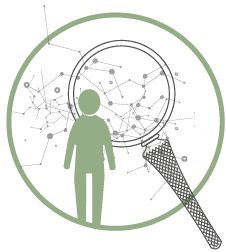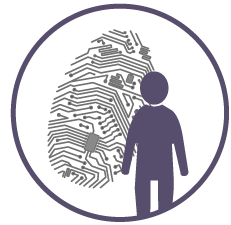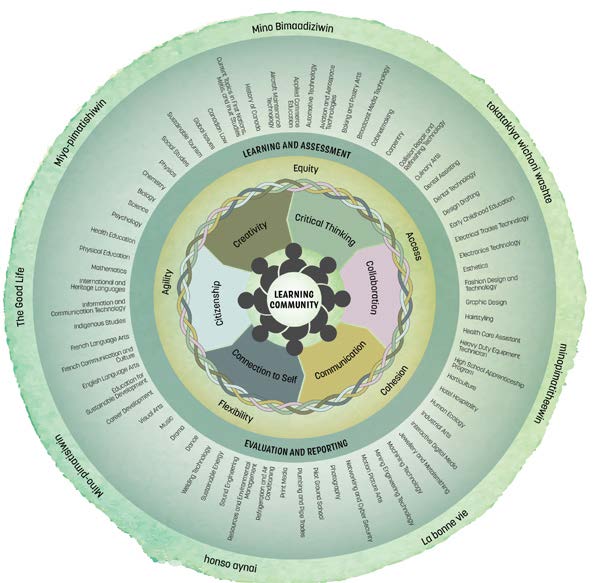
Last updated: April 2023
Framework for Learning Document ( 1.8 MB)
1.8 MB)
The Framework for Learning is being developed as part of Manitoba’s K to 12 Education Action Plan.
As work to construct and implement the framework continues, relevant content updates will be provided on this page.
Feedback and comments about the Framework for Learning are welcome and can be submitted here.
Purpose
The purpose of the Framework for Learning is to provide the blueprint on which essential elements of learning and teaching in Manitoba are organized. The Framework creates one access point for educators to find curriculum, assessment, evaluation, reporting, policy, and implementation for all four provincial programs. The Framework for Learning supports equity, creates access, develops and maintains cohesion, ensures flexibility, and allows for agility.
Guiding Principles of the Framework for Learning
Equity
Manitoba Education and Early Childhood Learning has committed to ensure that every Manitoban is valued and authentically represented in an equitable, socially just, anti-oppressive education system and, accordingly, a democratic society.
We strive to ensure that current and future practices and policies acknowledge and celebrate the valued inclusion of everyone. This is an ongoing journey that requires thoughtful engagement with equity-deserving communities. The Framework will be adjusted over time as we continue on this journey towards reconciliation and equity. We are committed to listening, seeking to understand, and taking action for every Manitoba learner and family.
Access
Every learner has the right to appropriate educational programming. That programming is the Manitoba curriculum. Inclusion is a belief that all learners can and do learn, in their own ways, in their own time.
The Framework’s foundation of global competencies illuminates new access points within the curriculum, as every learner comes with competence and with their own gifts to further develop in school.
As every learner must be included in the learning community, every educator must be included within the larger provincial system, seeing themselves valued as instrumental learning leaders. Provincial resources and processes are designed to welcome and support educators as they continue on their journey of professional growth.
Cohesion
A powerful education system is built upon a common vision and shared understandings. The Framework for Learning offers educators in Manitoba a unifying vision encompassing curriculum, assessment, evaluation, reporting, and implementation.
Education is complex with multiple elements and infinite variables. Aligning the principles and expectations of curriculum, assessment, evaluation, reporting, and implementation models will strengthen the system and facilitate collaboration at every level. The Framework for Learning outlines consistent processes for the development and piloting of curricula and assessments, resources, programs, and support materials. These processes will ensure that established criteria are upheld and that common formats and language are used across all documents and sites.
Flexibility
The Framework for Learning is a dynamic, responsive, and ever-evolving ecosystem where each component is essential and intertwined. The idea is not to impose a specific path on educators; rather, it offers a springboard that educators—using their professional judgment and working with learners—will use to make informed decisions regarding the global competencies, curricular content, and assessments that will frame learning experiences.
The Framework for Learning provides the tools for educators to map unique learning paths so that learners engage with curricula in authentic and meaningful ways.
Agility
Today’s world is complex and rapidly changing. To create the greatest opportunity for every Manitoba learner to live a flourishing life, curricula must be relevant, meaningful, and inspiring. It must include goals that will serve learners as they navigate and thrive in today’s world as well as in tomorrow’s. Therefore, a system that proactively adapts to changes in society and innovations in learning and teaching is required.
Within the Framework for Learning, a consistent process of review, reflection, and adjustment of curricula, assessment, evaluation, and implementation will lead to alignment with the larger community across all disciplines and cluster curricula, including provincial assessments and the provincial report card.
Framework for Learning Blueprint
The Framework for Learning is inclusive of the four programs offered in Manitoba: English Program, French Immersion, Français, and Senior Years Technology Education Program. Each program maintains the same solid foundation of goals, global competencies, learning experiences and evaluation, and reporting principles and policies, as well as the consistent curriculum structure, and engagement and implementation models. The richness of each program is maintained through unique elements and principles reflective of each program.
Goals
Learner success will look different for every child, and there are common traits shared among all successful learners. Learner success always means learners are prepared to reach their full potential and to live The Good Life in which they have hope, belonging, meaning, and purpose. It means they have a voice, feel safe and supported, and are prepared for their individual path beyond graduation. It means they have the capacity to play an active role in shaping their future and be active citizens, and they are able to live in relationships with others and the natural world. Finally, it means honouring and respecting Indigenous ways of knowing, being, and doing with a commitment to and understanding of Truth and Reconciliation.
Goals: More Information
The Great Questions of Life by Murray Sinclair
Leading The Good Life is leading a flourishing life while learning to live in balance. This is a lifelong endeavour where each learner comes to understand how to live in relationships with others and the natural world with respect, reciprocity, and interconnectedness. As shared by Senator Murray Sinclair, “in order for any society to function properly, it must raise and educate its children so that they can answer what philosophers such as Socrates, Plato, and Aboriginal Elders call ‘the great questions of life’.” (Sinclair).
Who am I? Where do I come from? Why am I here? Where am I going?
The Good Life refers to living a well-balanced life where all four components of a human are being addressed—emotional, physical, mental, and spiritual.
“It is through the taking of responsibility for their own personal healing and growth that individuals will be able to attain mino-pimatasiwin (Cree)—the good life.” (Hart 44)
Pimadaziwin is to have “life in the fullest sense, life in the sense of longevity and health.” (Overholt and Callicott 151)
“This growth and attempt to reach the good life is not just an individual focus. It also involves the family and community.” (Hart 44)
Hart, Michael Anthony. Seeking Mino-Pimatisiwin: An Aboriginal Approach to Healing. Fernwood Publishing, 2002.
Overholt, T.W., and J.B. Callicott. Clothed in Fur and Other Tails: An Introduction to an Ojibwa World View. University Press of America, 1982.
Global Competencies
Global Competencies Document ( 1.04 MB)
1.04 MB)
Manitoba defines global competencies as complex ways of knowing, being, doing, and becoming that are multi-faceted, interdependent, transdisciplinary, and developed over time. The learner accesses their ways of knowing, being, doing, and becoming to engage effectively and with purpose within a context. They provide learners with the ability to meet “shifting and ongoing demands of life, work and learning; to be active and responsive in their communities; to understand diverse perspectives; and to act on issues of global significance.” (CMEC)
Global competencies are interdependent, interconnected, expandable, and extendable. They guide the implementation of curricula, providing a common focus and language across disciplines and programs and giving a rich, holistic purpose for learning and teaching.
Creativity

Creativity involves exploring ideas and concepts in order to represent thinking, solve problems, explore opportunities, and innovate in unique ways. It is the interaction of intuition and reasonings.
The competency of creativity facilitates the generation and expression of ideas, concepts, solutions, and opportunities that are novel and have meaning and value for self, others, or the natural world. It fosters open-mindedness, curiosity, flexibility, risk-taking, and perseverance to put ideas into action.
Creativity is fundamental to finding and expressing a sense of wonder, initiative, ingenuity, and hope.
Critical thinking

Critical thinking involves the intentional process of synthesizing and analyzing ideas using criteria and evidence, making reasoned judgements and reflecting on the outcomes and implications of those decisions.
The competency of critical thinking facilitates the in-depth examination of situations, questions, problems, opportunities, and perspectives. It encompasses a willingness to challenge assumptions, thoughts, beliefs, and actions.
Critical thinking is fundamental to learning more broadly and deeply, and making ethical decisions as reflective and contributing citizens.
Collaboration

Collaboration involves learning with and from others and working together with a shared commitment to pursue common purposes and goals.
The competency of collaboration facilitates the co-construction of meaning to support collective understanding through the exchange and negotiation of ideas. The process of collaboration demands deeper reflection, an openness to different perspectives, and the sharing of responsibilities and planning. Effective collaboration results in the creation of something better.
Collaboration is fundamental to knowing oneself as a learner (in relation to others/working in a group), developing positive relationships, and participating in the learning process with confidence and motivation.
Communication
Communication involves interacting with others and allowing for a message to be received, expressed, and understood in multiple ways and for a variety of purposes.
The competency of communication facilitates the acquisition, development, and transformation of ideas and information as well as the awareness, understanding, management, and expression of emotions. It allows one to make connections with others, share ideas, express individuality, deepen learning, and celebrate accomplishments. Communication develops the ability and capacity to navigate personal, local, and global perspectives, and societal and cultural contexts.
Communication is fundamental to connecting to others and sharing/thinking about ideas, and to developing one’s identity and sense of belonging.
Connection to Self

Connection to Self involves awareness of the related nature of emotional, intellectual, physical, social, cultural, and spiritual aspects of living and learning, and the responsibility for personal growth, well-being, and well-becoming.
The competency of Connection to Self facilitates the development of reflection, regulation, advocacy, and management, which empower one to act with mindfulness and intention. The learner will come to know their gifts, strengths, culture, and history. They will build initiative, perseverance, flexibility, and manage failure and success as part of the learning process.
Connection to Self is fundamental to knowing oneself, and one’s relationship to others and the natural world, as well as developing hope, resilience, self-respect, and confidence. It is recognizing ones' own role in learning, happiness, and well-being.
Citizenship

Citizenship involves engaging and working toward a more equitable, compassionate and sustainable world through the development and value of relationships with self, others, and the natural world.
The competency of citizenship facilitates an understanding of the complex interactions among cultural, ecological, economic, political, and social forces and their impacts on individuals, communities, and the world. Citizenship fosters consideration of diverse perspectives for ethical, responsible, reciprocal, and sustainable decisions and actions.
Citizenship is fundamental to understanding who we are and how we have the capacity to make a difference and to make choices that contribute to our communities—for the well-being of all.
Global Competencies: More Information
This introduction situates the six global competencies as essential competencies for learners to flourish and to live The Good Life. Each global competency is defined and further illustrated with indicators that deepen in sophistication and complexity through Kindergarten to Grade 12. These global competencies are carried through each discipline and cluster as curricular competencies with additional descriptions and examples.
Curriculum
Organized by discipline, cluster, and grade level, all curriculum will have a consistent structure and format while maintaining the language of its discipline or cluster.
Curriculum: More Information
Each curriculum will consist of a discipline/cluster overview; a course overview; a multiliteracy statement; learning experiences and assessment; evaluation and reporting; enduring understandings; global competencies in the discipline/cluster; content outcomes; and key resources.
Learning Experiences and Assessment
Building on the guiding principles of this Framework for Learning and braiding together the beliefs and policies of Mamàhtawisiwin: The Wonder We are Born With and appropriate educational programming, learning experiences and assessment are shared, common elements of all disciplines and all grades. They define a collective approach to teaching and a holistic understanding of learning. The guiding principles seamlessly integrate effective instruction and assessment to support educators as they design learning experiences that strengthen students’ abilities to transfer, extend and expand their learning. Assessment is situated here as a partner in the learning process.
Learning Experiences and Assessment: More Information
The learning experiences that educators design, create opportunities for every learner to reach their full potential and live The Good Life. It is through the design of learning experiences that global competencies are developed. As educators design learning experiences, they create opportunities for every learner to further develop their global competencies within and across the disciplines and/or clusters. As the global competencies are context-dependent, they are linked to the discipline/cluster through the specific content and contexts explored. Thoughtful, authentic learning experiences contribute to learners realizing their way of being in the world by strengthening their global competencies, so that they live a flourishing life, now and in the future.
Evaluation and Reporting
In Manitoba, learning and achievement are communicated in multiple ways. A provincial report card is used as one method of communication. It serves to formally share with families learner progress over time and to establish new learning goals. Provincial evaluations at Grades 4, 7 and 10 will provide system-level data to inform provincial policy and direction.
Evaluation and Reporting: More Information
Evaluation and reporting are presented separately from assessment to offer direct links to guiding principles of fair, reliable, and valid evaluation. Additionally, links to the report card policy documents, the updated report card, report card scale descriptors, and sample comments will be provided.
Engagement and Implementation
Manitoba Education and Early Childhood Learning is committed to engaging and working collaboratively with education partners to support the ongoing development and implementation of the Framework for Learning. As work continues, more information will be provided.
Council of Ministers of Education, Canada (CMEC). Pan-Canadian Systems-Level Framework on Global Competencies. 2018, www.globalcompetencies.cmec.ca/global-competencies.
Sinclair, Senator Murray. “Education: Cause and Solution.” The Manitoba Teacher 93(3), The Manitoba Teachers’ Society, December 2014, www.mbteach.org/pdfs/mbt/2014/Dec14_MBT.pdf



